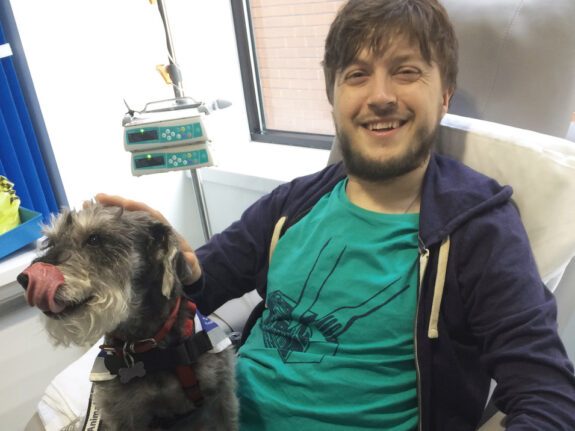
Thanks and memories
Dedication
This website is dedicated to the memory of my late son, Joe Lewis-Nunes, who died bravely of cancer on the 6th of February 2019.
The records of his first ten years of language are now part of my research, along with the records of other children (none for the same unusual length of time).
When Joe was twelve, he was able to give me some cogent advice about an ethical issue which arises in the elicitation of pseudo-words from small children. Joe said he thought it was important to make it clear that these were ‘pretend-words’, and not real words. I was working towards this idea in my own mind. Joe removed any doubts. I was used to the fact that at this young age he already had a good grasp of big issues concerning to adults. It was only as I was writing my eulogy for him that I realised how unusual he was in this respect. Significantly perhaps, his first job was as head of a school music department. He duly became a successful music teacher.
It was his dying wish that I should do what I could to restore a small fraction of the free music education from which he had benefitted during his childhood.
Joe is shown here with the therapy dog, Noodle. The last thing he said was to make a joke about how fortunate it was that he had not taken my advice to get himself a dog to keep him company. After his death, Joe’s dog and the cat which Joe had helped to get for us might have had problems together.
Thanks
To those who have taught me and to those who have directly or indirectly supported the development of this website.
The late Professor Lada Iosifovna Aidarova of Moscow University, whose thinking inspires and suffuses much of the thinking here. To my sadness, I was never able to meet, speak, or study with her. But I did meet someone who was taught in primary school by someone clearly trained in Aidarova’s approach. And I have been able to trace Aidarova’s daughter, who continues Aidarova’a work, getting some of the most extraordinary results.
Professor Martin Atkinson, now retired, but for most of his life from the Department of Language and Linguistics, Essex University, once came up to me, saying “You might be interested in doing an MA in Theoretical Linguistics”. I had no idea what Theoretical Linguistics might be, but I had gained such respect for Martin on a previous course, that I promptly said, “Yes, of course”. As Christmas approached I suggested to everyone on the course that we sent Martin a joint Christmas card. Everyone competed for the honour. The winning entry was a witty sonnet by Andy Spencer, then starting his PhD. Martin was quite the kindest of teachers, arranging for a special set of exams for me when I went down with an almost fatal appendicitis just before the exams were scheduled. With his usual kindness and generosity, Martin has just given me the text of what should have been his last book to help me with my ongoing studies and research. Still looking after old students 50 years on and 16 years into retirement.
Professor Ted Benton, Sociology Department, Essex University, who encouraged all of his students to think outside the box, but always with rigour and thinking through the consequences.
Doctor Caroline Bowen, speech and language pathologist, now retired, who hosted the listserve, Phonological Therapy for many years, and encouraged the development of much of the thinking here. While it existed, with 10,000 plus subscribers Phonological Therapy was by far the largest discussion forum for Speech and Language pathology in the English speaking world.
Liz Clarke, who supervised my clinical practice with adults, who went on to bravely become one of the comparators in the campaign for equal pay for speech and language therapists.
Professor Judith Duchan, on https://www.acsu.buffalo.edu/~duchan/index.html a source of much wise advice, introduced me to the work of the Reverend William Holder and John Thelwall, 350 and 200 years ago, arguably the first ever speech and language pathologists. Coincidentally Thelwall’s clinic, in what he jokily called ‘North Brixton Cottage’, was only a short walk from my own clinic. North Brixton Cottage is now a large block of flats.
Michelle Duffy, of sparxduffy@gmail.com the artist from Airdrie in Canada, who did the ‘heroes’ on this site, as these images are known by web site developers, the big images at the tops of the main pages. She has a deep knowledge of many of the complex issues discussed here.
Derek Gillard, the archivist of education in England who kindly encouraged the historical research here. www.educationengland.org.uk/links.html
Juliette Glover, president of the College of Speech and Language Therapists, who ran the speech and language therapy department at Barts Hospital, and introduced me to speech and language therapy, and later became one of my clinical supervisors.
Doctor Richard “Jack” Lewis, my wife’s nephew, who kindly and skilfully directed, shot and cut the videos on this site. He helped me say BRIEFLY what I needed and wanted to say.
My wife, Vivienne Lewis, now a much better photographer than I ever was, took the still pictures here. https://www.flickr.com/people/102981157@N03/
My eldest son, Alex Nunes, now helping with the logical, mathematical, and philosophical aspects of the proposal here, as he did with my PhD, Nunes (2002). The term, ‘Decouple’. for what I propose was the first, obviously crucial, step in the evolution of human language is due to Alex.
The late Mary Pletts, who supervised my clinical practice with children at the National Hospital College of Speech Sciences, and later became a personal friend, encouraging the research which eventually turned into the proposal here.
Olwyn Rhys, speech and language therapist from Welsh-speaking North Wales, who in 1994 gave me the crucial information that children from Welsh-speaking homes do not have lateral lisps.
Professor Chris Stringer, of the Natural History Museum, who kindly clarified some of the key research issues, some very recent, about the genetics of the paleoanthropology which intersects with the linguistic evidence discussed in the proposal here.
Professor Galina Zakharova, psychologist of education from Moscow, who kindly read and corrected my article on Lada Iosifovna Aidarova and found me a picture of Aidarova.
And the father of the child who came up to me in the road outside my clinic asking if I was the speech therapist. I said I was. He said he was a dustman, a very hard job at the time, humping four tons of rubbish on every shift. He told me that his son had had therapy for his speech and then been discharged when it was ‘within normal limits’, but it was still ‘not quite right’. When I saw his son, it was not immediately obvious what the problem was. Mindful of how definite his father had been, I investigated further. As soon as I tried some longer words, the problem was obvious. He could not say any of them. We were able to fix the problem. But trying to work out why these words were so hard led me to Possible Words Therapy and the research which led to my PhD and Nunes (2oo2). I don’t disclose his name for the sake of confidentiality.

